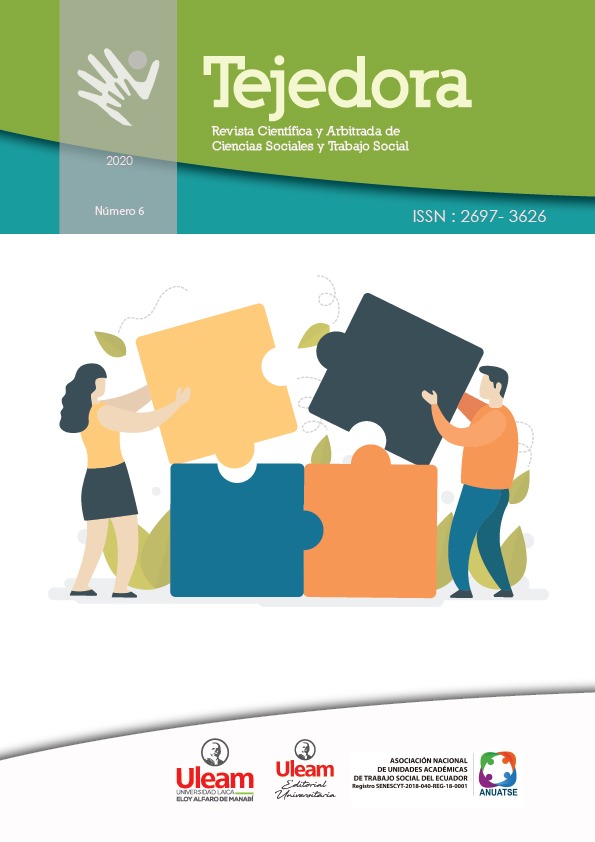THE STALKING OF PERSONAL INTEGRITY AND INSTITUTIONAL NORMALIZATION FROM A GENDER PERSPECTIVE
DOI:
https://doi.org/10.56124/tj.v7i13ep.018Keywords:
Pardon, right, personal integrity, freedom, guaranteeAbstract
Guaranteeing the right to personal integrity of those who are confined in the rehabilitation centers of Ecuador is an outstanding debt of the State; that he could not solve. Being the objective of the investigation to study the right to personal integrity of persons deprived of liberty, and the figure of pardon as a constitutional guarantee. Through the bibliographic, documentary and field study, the same one that was qualitatively based on the application of interviews with justice operators. In order to know from the criteria of those who are part of the operation of the State in the rehabilitation processes. The interview was open semi-structured with a non-formal script; but if contemplative of aspects that denigrate the very condition of being human beings due to the fact of having lost freedom. The interpretation of the findings determined that: overcrowding, extreme violence, the lack of rehabilitative prison policies, corruption, discretionary preventive detention, the same conception of gender; among other aspects, they are phenomena that have an impact on the impairment of the personal integrity of the inmates and inmates or how they define themselves; for the non-application of the pardon to other criminal figures that allow them to recover their freedom.
KEYWORDS: Pardon, right, personal integrity, freedom, guarantee
Downloads
References
Ávila-Fuenmayor, F. (2006). El concepto de poder en Michel Foucault. Telos, 215-234. Obtenido de https://www.redalyc.org/articulo.oa?id=99318557005
Ceas. (2017). Informe penitenciario. Una miradad al mundo carcelario peruano. Perú: Comisión Episcopal de Acción Social.
CIDH. (2022). CIDH presenta informe sobre situación de personas privadas de libertad en Ecuador. Washington: Comisión Interamericana de Derechos Humanos. https://www.oas.org/pt/CIDH/jsForm/?File=/es/cidh/prensa/comunicados/2022/053.asp#:~:text=Washington%2C%20D.C.-%20La%20Comisión%20Interamericana,penitenciaria%20que%20atraviesa%20el%20país.
Comisión Interamericana de Derechos Humanos. (2022). Personas Privadas de Libertad en Ecuador. Ecuador: OAS Cataloging-in-Publication Data.
Correa, R. (19 de enero de 2017). Registro Oficial órgano del Gobierno del Ecuador. Quito.
Corte I.D.H. (Opinión consultiva OC-11/90 del 10 de agosto de 1990). Excepciones al Agotamiento de los Recursos Internos (Arts. 46.1, 46.2.a y 46.2.b Convención Americana sobre derechos humanos.). Costa Rica: . Recuperado el 10 de agosto de 1990, de https://corteidh.or.cr/docs/opiniones/seriea_11_esp.pdf
Cué, R. (2022). Ecuador indultará a 5.000 reos para reducir el hacinamiento carcelario. América Latina.
Defensoría del Pueblo Ecuador. (2022 17 de marzo). En relacion al informe sobre la situación de personas privadas de libertad en Ecuador presentado por la CIDH. Quito: Pronunciamientos. https://www.dpe.gob.ec/en-relacion-al-informe-sobre-la-situacion-de-personas-privadas-de-la-libertad-en-ecuador-presentado-por-la-cidh-este-17-de-marzo-de-2022/
Fajardo , L. (2018). Derechos humanos de personas privadas de la libertad en Colombia. Revista republicana, 127-144. doi:https://doi.org/10.21017/rev.repub.2018.v24.a43
Galindo, J. (2016). Contenido del derecho a la integridad personal. Revista Derecho del Estado, 89-129. Obtenido de https://www.redalyc.org/pdf/3376/337630233004.pdf
González , J. (2021). El indulto: UNa institución histórica e históricamene cuestionada. TEORDER(30), 10-23. doi:DOI: doi.org/10.36151/td.2021.012
Jaramillo, C., & Astudillo, P. (2018). Reformas legales al artículo 74 del código orgánico integral penal, relacionado al indulto presidencial, con la finalidad de garantizar los derechos constitucionales de las personas privadas de la libertad, con enfermedades catastróficas. [Tesis de grado, Universidad Nacional de Loja]. Repositorio digital de la Universidad Nacional de Loja. http://dspace.unl.edu.ec/jspui/handle/123456789/20915
Medina, F. (22 de mayo de 2017). Presidente Correa indulta a dos procesados por el 30S. Quito, Ecuador: https://www.elcomercio.com/actualidad/seguridad/presidente-rafaelcorrea-indulto-procesados-30s.html.
Melo , J. (2020). Clemencia y obediencia. El vínculo amoroso entre el rey y los vasallos del Nuevo Reino de Granada entre 1780 y 1800. Historia Crítica, 25-43. doi:https://doi.org/10.7440/histcrit78.2020.03
Montaño, J., & González , A. (2022). El indulto presidencial, principales elementos jurídicos en la legislación ecuatoriana. Sur Academia: Revista Académica-Investigativa De La Facultad Jurídica, Social Y Administrativa, 9(18), 70–89. https://doi.org/10.54753/suracademia.v9i18.1366
Muñoz, J. (2017). La falta de limitación del indulto presidencial, en el Ecuador, contenido en el Art.74 dle COIP. Quito: Universidad de los Hemisferios.
Ruiz , A. (2018). Gracia y justicia: el lugar de la utilidad pública (justicia transicional y situaciones de necesidad). Eunomía. Revista en Cultura de la Legalidad(15), 26-45. Obtenido de ISSN 2253-6655
Santana, D. (2016). Desmontando el indulto (especial referencia a los delitos de corrupción). Revista Española de Derecho Constitucional, 51-91. doi: http://dx.doi.org/10.18042/cepc/redc.108.02
Sar, O. (2008). Derecho a la integridad personal en el Perú: Aspectos constitutivos y limitaciones. El caso de las personas privadas de libertad. Cuestiones constitucionales, 211-282.http://www.scielo.org.mx/scielo.php?script=sci_arttext&pid=S1405-91932008000200008&lng=es&tlng=es.
Published
How to Cite
Issue
Section
License
Copyright (c) 2024 Revista Científica y Arbitrada de Ciencias Sociales y Trabajo Social: Tejedora. ISSN: 2697-3626

This work is licensed under a Creative Commons Attribution-NonCommercial-ShareAlike 4.0 International License.






















